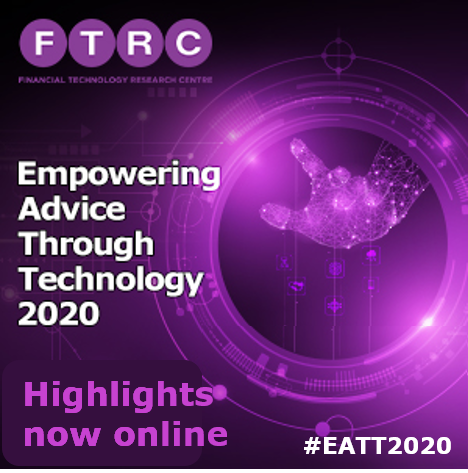
Putting ESG Solutions into Practice: April Investment Forum Part 2

Our April Investment Forum focused on how technology can help advisers adapt to ESG regulation, featuring expert speakers Andy Pettit from Morningstar, Terence Moll from 7iM, and Elena Philipova from Refinitiv. This is the second of three posts, and will be looking at the timeline of incoming regulations, client preferences, and how technology can stop greenwashing.
86% of our attendees reported that the session was very relevant to their organisation, and 71% found it to be very useful to their practice. The average overall rating for our Forum was 4.57 stars, with one of our participants commenting that the meeting was “very useful, relevant and topical.”
What is the timeline looking like for getting these processes into practice?
There is currently a window to prepare, in that it’s less mandated at this point in time. There is more client demand and more awareness in the general population. The key thing for advisers right now would be how they’re introducing the conversation to clients and mapping products to the ranges client outcomes.
Yes. So I think the urgency is pretty much the same, but I think there’s a little bit of luxury in that it’s less mandated at this point in time. And there’s an opportunity to kind of see the direction of travel from Europe in particular and other places. A kind of window to prepare, if you like, also, I think it’s not just a regulatory or political angle to focus on, but it’s also a client demand and a kind of Gréta and Attenborough effect. There’s more and more people aware and concerned of these issues and wanting to be involved. So it’s also an opportunity.
From my knowledge of the FDA’s direction of travel, they are looking much more at least to start with it, more principles based, much less prescriptive or detailed set of rules, although I think longer term it will probably head in that EU kind of direction. I think they’re all also very conscious about not making it too onerous for firms in terms of giving them a completely different rulebook to comply with in the UK from the rest of Europe. I think from an adviser’s practise point of view, the key thing is starting to think about how they’re going to approach this question of sustainability, how are they going to introduce that into their client conversations and how they will think about then mapping the range of products to the set of outcomes that they want for any subset of their client base.
The earliest reporting is going to come around 2023-2024, until then we have to work to close a lot of gaps.
Elena Philipova:
I mean, we know that when we talk about timelines until it’s done, those concepts can change and are subject to delays, as we’ve seen many of these regulations being a few times delayed. But from an issue reporting standpoint of view, we know that the earliest issuers and we’re talking about issuers that are impacted by previous NFR now CSRT the scope will expand. But from a timeline point of view, the earliest reporting is going to come out in 2023-2024 the previous reporting period. So that’s a few years away from now. And until then, we have to continue closing a lot of gaps. And even after that, the gaps will continue to exist because there are lots of other corporations that, for whatever reason, will not be incentivised to report according to EU reporting requirements.
So in dimension there is this push that we see in the industry around convergence of reporting standards at the global level is critical, and I think it’s one that everyone should try to support in whatever way they have and can, because that, I believe, is one of the most important prerequisites to so for the data challenges that we all experience in complying with regulation. The Taxonomy timelines are in different phases. We know that the Delegated Act for the climate objectives just came out. Next will come the remaining environmental objectives as well as the social taxonomy. But that’s probably unlikely to happen this year, next year, so lots of things to follow.
But on a positive note, I think it’s worth also mentioning that China released its green project catalogue just a few days before the World Leaders Summit on Climate, which again is another signal that the markets should interpret as an effort for collaboration and coordination across economies and across nations and jurisdictions to tackle climate as a first priority, but sustainability more broadly speaking. So I would expect that we’re going to see a lot of answers to some of the problems we face as a market being clarified sooner rather than later. Quicker than we expect is my hope.
If the long-term requirement is to honour clients’ preferences, ESG is only one aspect of that—so where is the data backing up that this is an imminent issue we need to adapt to?
Adam Smith:
There’s this view, and I think all three of you expressed it, that advisers need to make some changes. I’m still not sure that when I talk to advisers, that they’re utterly convinced on that because the long term requirement on advisers is that they understand the needs, objectives and preferences of their clients before they make a suitable recommendation. Preferences is pretty broad and includes all of this stuff. So I’m just curious as to when you say that this is a this is an immediate requirement its absolutely there, where is the data that’s backing that up, other than what we’re seeing in terms of where assets are moving, which is principally driven by institutional flow, not retail flow.
We have been seeing a lot of clients in certain markets moving towards ESG, and national budgets moving that way as well. The regulations are coming across the jurisdictions and markets but presumably at different rates.
Elena Philipova:
I mean, from my experience in working with advisers, I think that so far a lot of their actions have been customer led. And I’ve been hearing many advisers actually being left by their clients because they have not provided sufficient recommendations on ESG-related products to meet their preferences. So far, it’s been customer driven and surely there are some markets where we see that’s more so than other markets. From a regulatory push it’s quite clear now it’s with a Green Deal that actual national budgets are starting to link up to this agenda as well.
That’s why I think we saw quite a lot of tension prior to finalising the Taxonomy Delegated Acts on Climate and some nations getting quite nervous that their budgets actually now will depend on alignment to the Taxonomy and how green the different projects and assets that they are allowed to invest or are not allowed to invest.
So inevitably, the private sector, including retail investors, are part of the equation. I mean, from a legal text point of view, I am not too familiar with what is the timeline for when they will be required to mandate it and when it’s going to become a lot more prescriptive to include sustainability preferences when providing products. But it’s coming all directions is what I would assume, but not equally across all jurisdictions and markets and not at the same speed and timelines.
We’ve seen the number of client enquiries around ESG go up 10-15 times in the past couple of years.
Terence Moll:
Yes, I agree very much with Elena’s points. Our experience in the last probably about the last 18 months or so is that we’ve had lots of clients coming to us and saying, “listen, guys, what do you think about the ESG?” It’s been quite extraordinary. The number of client queries has really gone up 10 or 15 times compared to two years ago. It’s quite extraordinary. And we’ve begun to build ESG into our suitability process, and we found that most clients who encounter it found it pleasing that we’re doing this, not all of them agree with it, which is absolutely fine, its their choice.
But it certainly is leading to a change in how we relate to clients, and I think that’s going to lead to a change in the nature of the business in due course, and we do expect regulation to come in here and for the clients preferences to be prescribed in some form, so there will be questions that you absolutely have to find out from your client. We’d expect that to be in a couple of years time. But we are beginning to take these issues onboard ourselves right now because our clients want us to.
How can technology help stop greenwashing?
Disclosure regulation paired with technology is a landmark in containing greenwashing.
Andy Pettit:
Yes, I think technology can stop greenwashing probably in a few ways. One, the obvious, I guess, is using it to pause– we’ve spoken a lot about the flow of data is going to increase both from issuers and product managers. And there’s already a lot, there’ll be more. So using technology to pause that in a meaningful way is an obvious help. So I’m thinking in terms of I guess an obvious one is the holdings of individual funds and seeing which ones comply with certain ESG views. But also there’s going to be these additional disclosures coming out of the disclosure regulation, which I think will fall to products that are making ESG claims to substantiate their objectives and how successful they’re being and getting towards them with a range of benchmark-type data, underlying holdings data and individual indicators.
The more that that can be distilled and filtered, the more helpful that will be. I think disclosure regulation, I think is a landmark in terms of constraining greenwashing opportunity by putting these additional measures and then using the technology to get at that data and also then to take it a step further and start to filter those products down to meet or to match with client preferences and make recommendations that dovetail.
Minimising greenwashing was a priority on the agenda and the drive towards transparency and standardisation is present in all the regulation. Technology has a key role to play in managing the influx of data and differentiating between data sets.
Elena Philipova:
I mean, the whole agenda, one of the main objectives is to minimise the risk of greenwashing, as this was one of the primary concerns that European regulators heard when serving the market. So in every single regulatory text that was released, you see that drive towards greater transparency and standardisation. And that’s key for minimising greenwashing. When you leave a lot of flexibility in the market, then you start seeing the emergence of greenwashing– and maybe just for everyone’s benefit when we talk about greenwashing, we mean claims that a product, a company, a project is ‘green’ when it doesn’t actually meet those environmental objectives that that it suggests it should.
So I want to emphasise on the importance for transparency, standardisation, auditability, better data. And it’s not only about easier reporting and data, it’s about the financial products that are available in the market as well. We’ve heard scepticism around the fact that many funds that have existed for a year suddenly call themselves sustainable. How is that possible? Is it greenwashing? There are different theories there as well and different points of view, but also the eco-labelling and introducing standards around how products should be labelled and how they should communicate on the ESG characteristics or objectives that they need to end users is important we talk a lot about regulation and regulation, of course has a critical role to play. But we’ve seen a lot of work coming up from the private sector as well.
To give you an example, I was on the ESG Working Group of the CFA Institute, which was tasked to help CFA develop an ESG classification for financial products. So all these initiatives really take this concern around greenwashing and offer solutions for it.
And on your question around technolog, I think that technology has a critical role to play. Obviously, we will continue seeing the amount of data flowing in increasing. And it’s important to differentiate between core data-sets and kind of alternative data-sets and keep on making the analogy between financial and ESG data. They are not fundamentally different, although they measure things that are fundamentally different as data-sets and how these data-sets should be used, they’re not fundamentally different. And where technology plays, in what way, differs. Whether we talk about core ESG data, which we can equate as is the main financial statement data versus alternative data, which of course can be sourced from many different sources, like satellite information that can be used to complement and fill in the gaps.
In my experience, the push for ESG adoption is top-down, I’ve seen no push from clients to make ESG a priority.
Alan Easter:
I don’t want people to misunderstand my statement, I think that ESG is a great thing to do and I think it’s the right direction for the industry. But I think we need to be mindful of Adam’s comments, which I totally agree with, that it’s a top down, supply-led initiative. At the moment I’m involved in a number of distributors and intermediaries and I see nothing at the client end on an unprompted basis with clients coming in and saying “hi, tell me about ESG”.
I think if you would have asked the vast majority of retail clients their top three investment priorities, it’s make me as much as you can, take as little risk as you can, reduce your charges down as low as you can. I don’t see anyone coming in at all and I’m getting no demand led requests from advisers at all. Again, open brackets, it is the right thing to do and it’s the right direction to go in, but this is certainly, in my observation, regulatory and supply led, not client and demand led.









